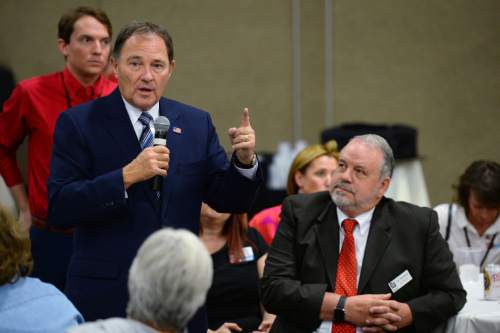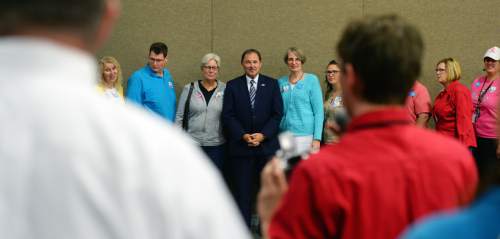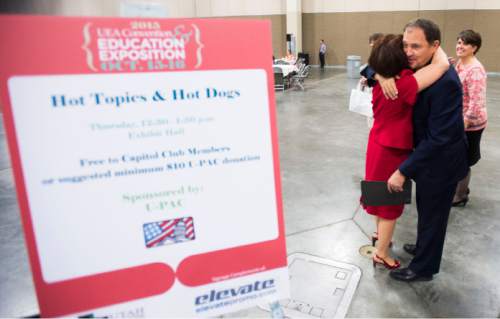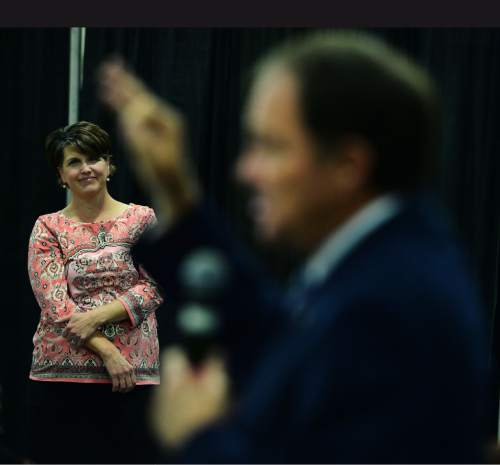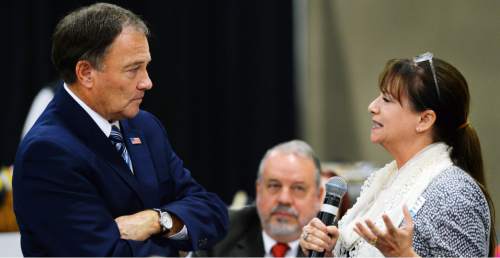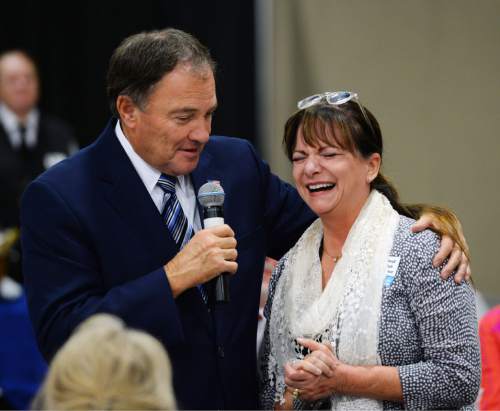This is an archived article that was published on sltrib.com in 2015, and information in the article may be outdated. It is provided only for personal research purposes and may not be reprinted.
Utah Education Association President Sharon Gallagher-Fishbaugh said she would not "sugarcoat" her comments during a panel discussion at the association's annual convention on Thursday.
That led to an often heated back-and-forth between the outgoing UEA president and Utah House Speaker Greg Hughes, who was frequently cast during the discussion as a proxy for the Utah Legislature and its perceived micromanagement of public schools.
During a segment on Utah's controversial practice of awarding schools a letter grade based on test scores, Hughes criticized Gallagher-Fishbaugh for her cynicism, while she rebuked lawmakers for disrespect toward teachers, parents and children.
"This is a bad policy," Gallagher-Fishbaugh said. "It has not made a difference. Parents do not know what a D means or an F means, and neither do those students."
Hughes responded that any student can succeed, even those living in low-income neighborhoods, and it's wrong to assume that a school's grade will correspond with its ZIP code.
"I was so zen-like when I got here," he said. "Now I'm all riled up."
After Hughes said school grading had prompted him to visit a low-performing school, National Education Association Vice President Becky Pringle commented that she hates when people who have only visited schools are the ones making education policy decisions.
She said the word "accountability" had taken on a new meaning, in that test scores are now the only measure of success and teachers carry the sole responsibility for failure.
"We have decided we're going to scapegoat teachers," Pringle said. "That's what is wrong with education policy — the people who know and understand teaching and learning aren't making the decisions."
And Salt Lake City Democratic Sen. Jim Dabakis said that most Utah lawmakers live in an "alternate universe." The Legislature awards grades to schools and requires more testing of students, he said, but care little about Utah's ranking as the least-funded public education system in the nation on a per-student basis.
"The Legislature ought to butt out of classrooms," Dabakis said. "The Legislature ought to keep its mouth shut except for figuring out how to get another billion dollars in K through 12."
He criticized past changes to the tax code enacted by lawmakers that set a flat income tax rate and divided revenue between public and higher education.
Those changes, he said, cost Utah's public education system to the tune of roughly $700 million.
"It went out of our classrooms and into the pockets of the Romneys and the Huntsmans and our richest people," he said. "It was a direct check."
Hughes was critical of the ongoing requests for new funding by educators. He said each year lawmakers direct more funding to Utah schools, only to hear that schools continue to fail and more money is needed.
"It feels like a circular argument," Hughes said. "I need more. We need more."
Hughes said he wasn't at the panel "to win a popularity contest," and that lawmakers represent their constituents, including those who are critical of public education.
He said education priorities like smaller class sizes and higher teacher salaries are contradictory, and suggested the state could pay teachers better if Utah assumed ownership of federal lands in the state and if schools operated year-round.
The vocal convention crowd gave Hughes his only applause on a policy issue when he said local school districts should decide whether to work with teacher groups, and that he had no intention of interfering with collective bargaining rights.
Utah Gov. Gary Herbert also visited the convention, though he did not participate in the panel discussion.
At a lunchtime event, Herbert answered questions and thanked teachers for their service to Utahns.
"You're making a significant difference in people's lives," he said. "Second only to parents are teachers and their influence for what people become."
South Ogden Junior High teacher Kim Irvine told Herbert that mandates from the state detract from the time she has to prepare lessons for her classroom.
She said data-driven initiatives, particularly analysis of computer-based testing systems, tell her little that she doesn't already know about the progress and needs of her students.
"Get out of the way and let me teach," she said.
Herbert said there's a need for more dialogue between educators and policy makers. He said people have preconceived notions about Utah's Republican majority and the membership of the Utah Education Association, but those assumptions should not get in the way of collaboration.
"Most of the things we're talking about ought not to be partisan," he said. "I don't care if you're pulling the wagon from the left side of the wagon or the right side of the wagon. I care that we're pulling the wagon in the same direction."



